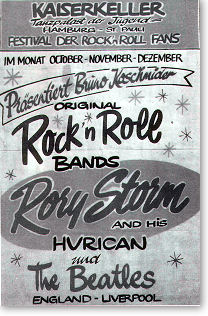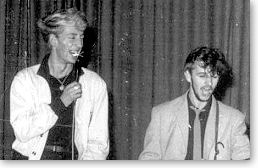|
Rory Storm in Hamburg Conversations with Pete Best |
|
| By Pete Best and Bill Harry |
 During a week-long session of interviews with Pete Best I asked him about Rory Storm, a legendary figure of the Mersey scene. Pete was able to tell me of the time the Beatles supported Rory and his group at the Kaiserkeller club.
During a week-long session of interviews with Pete Best I asked him about Rory Storm, a legendary figure of the Mersey scene. Pete was able to tell me of the time the Beatles supported Rory and his group at the Kaiserkeller club.
“When Rory Storm and the Hurricanes arrived, they were given top billing above us on the posters outside the club. I think it was because of their reputation in England.
“By this time we’d been in Germany about two months, so I suppose if you look at it from a club owner’s point of view, he’s
publicizing the fact that he’s showcasing another new band from Liverpool and the Beatles. But when the posters went up, we said, ‘Hey, Koschmider, what’s going on? We’ll blow these guys off the stage.”
“I think Rory must have heard that we’d become the top dogs in Hamburg, too. It must have been Howie Casey who spread the news. When Howie went home, he played at the Casbah. My mother told him I’d been writing, but she still asked, ‘How are the boys doing out there?’ Howie said, ‘you will not believe them when they come back home. To coin a phrase: they went out boys and they’re going to come back men. They’ve changed and it’s for the good and they’re really gonna surprise people.’
“So Mo wrote that big things had been said about the band. Rory must have heard about the change, too.
“Rory Storm & the Hurricanes were one of the top bands in Liverpool at that time. Very professional, with very slick routines. It was great for Koschmider because he got rid of one showman and got another back in.
 “Even though they were billed over us, on the musical front we were still the top dogs. The Hurricanes were getting a good response, people liked them…if they didn’t like them they’d show it, it was that simple. Yet we were still the ones who were bringing the house down. It was good because there was camaraderie there. We grew very close, which happens with bands when you’re away from home, living under the same roof together and playing in the same club. It was interesting that there was always a very friendly rivalry, if I can put it that way. Especially on a Saturday night, which was the big night.
“Even though they were billed over us, on the musical front we were still the top dogs. The Hurricanes were getting a good response, people liked them…if they didn’t like them they’d show it, it was that simple. Yet we were still the ones who were bringing the house down. It was good because there was camaraderie there. We grew very close, which happens with bands when you’re away from home, living under the same roof together and playing in the same club. It was interesting that there was always a very friendly rivalry, if I can put it that way. Especially on a Saturday night, which was the big night.
“We’d laugh and joke about it with the other band. You know: ‘We’ll blow you off the stage tonight. You go out and do your best bit, go on, see what you can do and we’ll still come out and take you to the cleaners.’ ‘Oh no you won’t,’ and so on.
“It was just banter but it added to the excitement and the atmosphere and the German audiences were electrified by it because we came up with things to outdo one another. We were all enhanced by the competition – word was out and the audiences were getting bigger.
“Even while Derry was there, there were people who just came to see the Beatles. We had our regular following at the Indra and when we went to the Kaiserkeller we had a combination of both of them.
“This is where the truth differs from the legend again. Those days, the image people have of those days are of an audience that was always made up of drunken sailors and troops. It wasn’t. It tended to be regular German people who came out to listen to the rock and roll bands, dance, enjoy themselves, get drunk. As to the violence, I suppose it depends on which way you look at it. If you’re brought up in that environment, then it probably doesn’t seem so violent.
1 | 2
|
All content (unless otherwise stated) ©
Bill Harry/Mersey Beat Ltd. |
